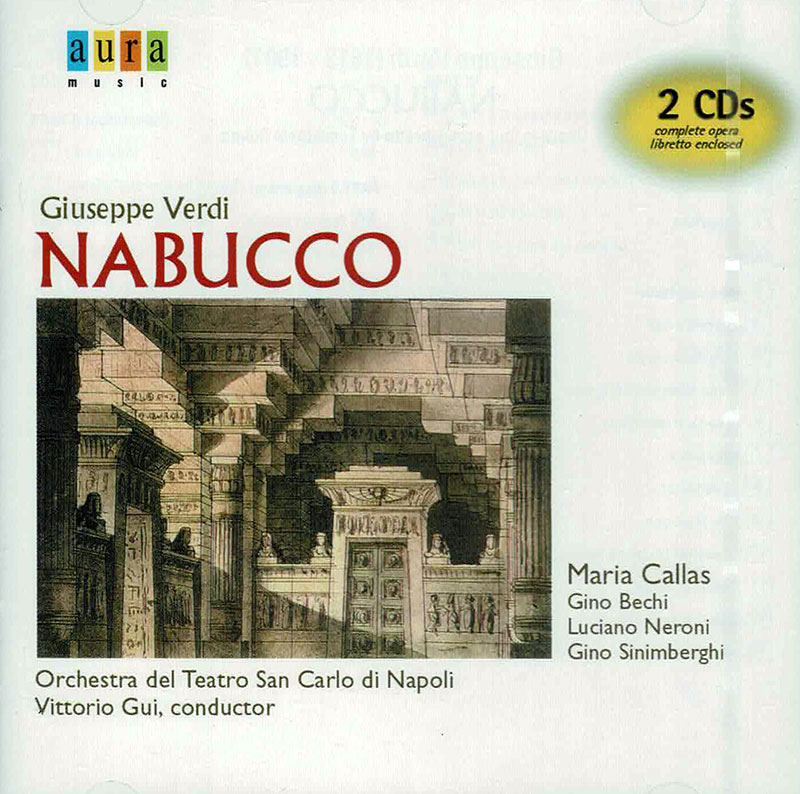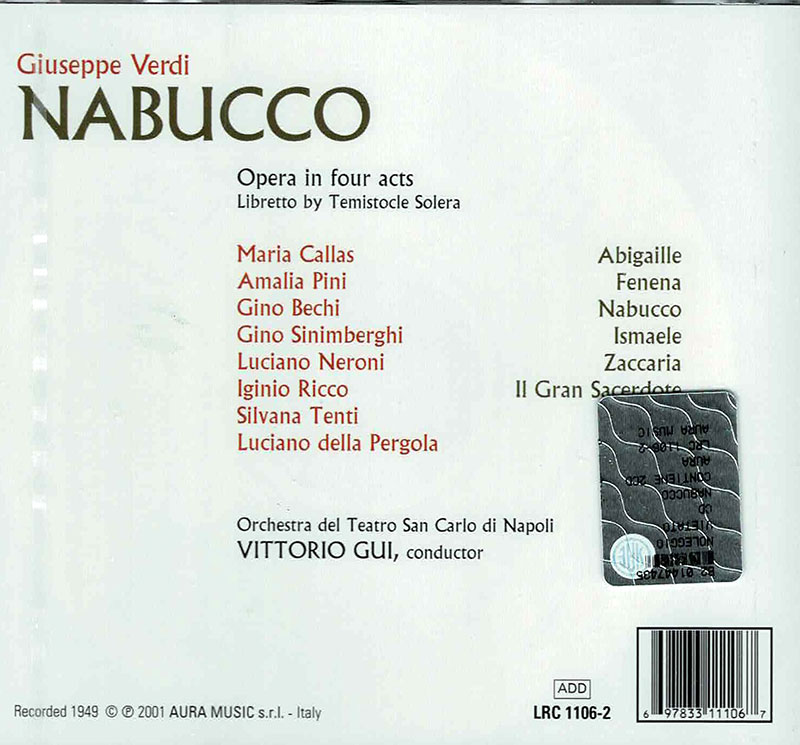Logowanie
Dziś nikt już tak genialnie nie jazzuje!
Bobby Hutcherson, Joe Sample
San Francisco
SHM-CD/SACD - NOWY FORMAT - DŻWIĘK TAK CZYSTY, JAK Z CZASU WIELKIEGO WYBUCHU!
Wayne Shorter, Freddie Hubbard, Herbie Hancock, Ron Carter, Elvin Jones
Speak no evil
UHQCD - dotknij Oryginału - MQA (Master Quality Authenticated)
Chesky! Niezmiennie perfekcyjny
Winylowy niezbędnik
ClearAudio
Double Matrix Professional - Sonic
najbardziej inteligentna i skuteczna pralka do płyt winylowych wszelkiego typu - całkowicie automatyczna
VERDI, Maria Callas, Gino Bechi, Luciano Neroni, Gino Sinimberghi, Orchestra e Coro del Teatro San Carlo di Napoli, Vittorio Gui
Nabucco

CRITIC REVIEWS: “GINO BECHI, like many singers of his generation, was denied a full international career because of the Second World war. The Italian baritone, whose voice was at its splendid best during the 1940s, was not heard in London until September 1950, when he sang in Otello and Falstaff at Covent Garden during a visit - the first since the war - of La Scala from Milan. Although then only 37 years old, Bechi was accused by the critics of having little voice left. The audience, however, starved of the authentic sound of Italian voices in Italian opera, was less dismissive and greatly enjoyed the baritone's Iago and Falstaff; Bechi was never a subtle artist, but there was a generosity in his singing that captivated the listener. Born and educated in Florence, Gino Bechi made his stage début in 1936 at Empoli as Germont père in LA TRAVIATA. The following year he was engaged at the Rome Opera, where in 1939 he sang Vladimir in the premiere of MONTE IVNOR by Lodovico Rocca. He first sang at La Scala in January 1940, as Don Carlo in LA FORZA DEL DESTINO, and appeared there throughout the war years. His repertory included Verdi roles such as Renato (UN BALLO IN MASCHERA), Don Carlo (ERNANI)and Rigoletto, but also Rossini's Figaro, Severo in POLIUTO, Sir Richard in I PURITANI and Jokanaan in SALOME (in Italian). He sang in Florence, notably in the premiere of Alfano's DON JUAN DE MANARA in the Maggio musicale of 1941. When La Scala reopened in 1946, Bechi sang the title-role of NABUCCO, one of his finest roles, which he repeated at the San Carlo, Naples in 1949, with Maria Callas as Abigaille. After the visit to Covent Garden by La Scala, Bechi continued to sing with the company until 1953; his last appearance was as Alfonso in LA FAVORITA. On his retirement from the stage in the early 1960s, Bechi taught in Florence. He made many recordings and can he heard at the peak of his career, when his voice was in full bloom, as Alfio in CAVALLERIA RUSTICANA, conducted by Mascagni; he also recorded Figaro, Renato and Gerard (ANDREA CHÉNIER), while the Naples NABUCCO with Callas was captured 'live' on disc.” - Elizabeth Forbes, THE INDEPENDENT, 16 Feb., 1993 “Callas closed 1949 with her only stage appearances in NABUCCO….That no further performances took place is not only odd but lamentable, for she is magnificent in every way in this Amazonian rôle of Abigaille. This set provides the earliest documentation of a complete rôle sung by Callas in actual performance….At Abigaille’s entrance…[Callas’] effect is electrifying….” - John Ardoin, THE CALLAS LEGACY, pp.5-6 “In the summer of 1933, Neroni was admitted to the finals of the National Competition of Bel Canto del Maggio Musicale Fiorentino, won two radio concerts and booking for LUCIA DI LAMMERMOOR in Milan. That autumn, he was a finalist in the Bologna Young Artists Competition, and was contracted to the Teatro Argentina in Rome during the opera season, to be conducted by Mascagni. This experience led to him also the first recordings for the EIAR. After 1933, Neroni embarked on the major portion of his career, featured in AÏDA, BARBIERE, LA BOHÈME, CAVALLERIA RUSTICANA, ERNANI, FALSTAFF, LA FORZA DEL DESTINO, LA GIOCONDA, LUCIA DI LAMMERMOOR, NABUCCO, NORMA, RIGOLETTO, LA SONNAMBULA, TOSCA, LA TRAVIATA, IL TROVATORE and TURANDOT, throughout Italy. His career was interrupted in 1943-44 by having been imprisoned by the Nazis. His career recommenced with the end of the war, 1945. After successes at San Carlo, Rome Opera, La Scala, and at Covent Garden in London, he was featured with Gigli, Callas and Tebaldi. Neroni was launched for the final international success to sing at the Teatro Colón of Buenos Aires, and in 1951 was offered a Met Opera contract, but he died prematurely at age 42.” - Zillah Akron Dorset


































